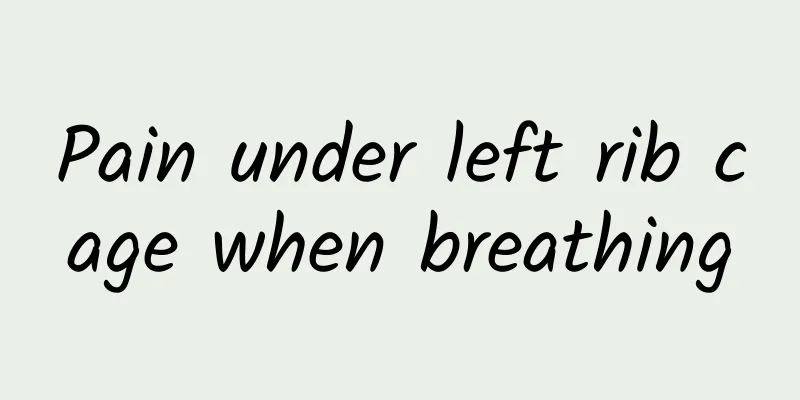What causes anal tear?

|
The main causes of anal tearing include: constipation, bad bowel habits, trauma, infection and ischemia, etc. In addition, some patients are caused by the body's own problems, so they should pay attention to prevention in daily life. 1. Human body factors The human body's external anal sphincter extends from the coccyx to the back of the anal canal, and is divided into two parts. It goes forward along both sides of the anal canal around the anal canal, and the two parts are connected in front of the anal canal, leaving gaps in the front and back of the anal canal. Most of the anal levator muscle is attached to the sides of the anal canal, with less in the front and back. The back and front of the anal canal are not as strong as the sides and are easily damaged. The anal canal extends downward and backward to form the anorectal angle, and the back of the anal canal is subject to greater pressure from feces. Lack of blood supply and low elasticity in the posterior midline of the anal canal can lead to anal fissures. 2. Constipation Long-term retention of feces in the rectum can induce rectal cancer, and the accumulation of feces also affects blood circulation. When patients forcefully expel dry feces, the anus will inevitably be under greater pressure, resulting in a series of pathological changes such as cracks and swelling. Therefore, when treating anal fissure patients, it is important to cure constipation to prevent recurrence of anal fissure. 3. Improper bowel habits Long bowel movements can easily cause blood stasis in the anus and rectum and induce disease. Smoking while going to the toilet can buffer the brain's defecation reflex and can easily cause constipation. Exerting excessive force during defecation or struggling blindly and continuously will only increase the burden on the rectal, anal and pelvic floor muscles and cause local congestion, leading to the occurrence and development of anal fissures. 4. Trauma Patients with chronic constipation are prone to damage the skin of the anal canal due to their dry and hard stools and excessive force when defecation. Repeated damage can cause deep lacerations that extend through the entire layer of skin, forming chronic infectious ulcers. It has been reported that constipation causes anal fissures in 14% to 24% of cases, but constipation may also be a consequence of anal fissures due to the patient's fear of defecation. In addition, birth trauma can also cause anal fissures, accounting for about 3% to 9%. Frequent bowel movements during diarrhea can easily damage the sensitive and tight anal canal, and repeated damage can lead to chronic infectious ulcers. 5. Infection Chronic inflammation near the dentate line, such as anal sinusitis in the posterior median area, spreads downward to cause subcutaneous abscesses, which rupture and become chronic ulcers. The reason why the anal canal is difficult to heal after injury is still unknown. Some people believe that it is mainly caused by injury and infection. During infection, inflammatory cells can release collagenase to prevent the regeneration and extension of epithelial tissue. 6. Ischemia Recently, some people have proposed that ischemia of the posterior midline of the anal canal is the reason why anal fissures are common in this area, because the distal end of the anal canal is supplied by the inferior rectal artery, which passes through the ischiorectal fossa and branches out into small branches through the anal sphincter to the mucosa, but most posterior commissures lack branches of the inferior rectal artery (accounting for 85%). Capillary morphological studies also suggest that the capillaries inside the internal sphincter at the posterior midline are relatively sparse. Some people used laser Doppler blood flowmetry to measure that the blood flow at the posterior anal junction is less than that in other quadrants. All of the above indicate that ischemia is indeed the main factor in the development of chronic anal fissure. |
>>: How to do anoscopy? Just three simple steps
Recommend
What to do if you keep sweating after abortion
Abortion itself is a surgery that is very harmful...
What's wrong with stomach pain and fever?
Generally, people with poor stomachs will experie...
How to deal with toothache? Eight ways to quickly relieve toothache
As the saying goes, toothache is not a disease, b...
How bone tuberculosis is spread
Generally speaking, tuberculosis mostly appears i...
Corn and pork ribs soup, three methods are most worth learning
Among the common delicacies, corn and pork ribs s...
How to store fresh Polygonatum
Polygonatum sibiricum is a very common tonic Chin...
The number one anti-cancer food: Chinese medicine
In modern society, the range of people suffering ...
Allergic conjunctivitis
Allergic conjunctivitis is a type of disease. In ...
Effects and functions of kelp meat
The name of Terminalia chebula meat sounds like t...
Anti-itching ointment
Many people will inexplicably grow a lot of small...
Can moxibustion remove dampness?
Moxibustion has a history of more than 2,000 year...
What are the complete recipes for Chinese medicine wine soaking for nourishing the kidney and strengthening yang?
If men want to continuously keep themselves in th...
Spasmodic cough
People's bodies are different, and the minor ...
Sore throat, general fatigue
Many people may have encountered this situation: ...
What are the characteristics of TCM health preservation?
Health preservation is something that many of our...









